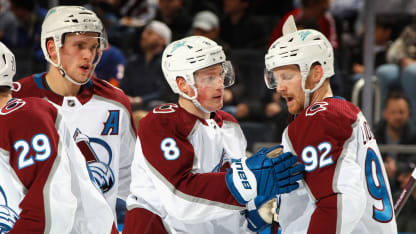Avalanche have 'level of urgency' ahead of Stanley Cup Playoffs
Colorado looking to make postseason run after three straight second-round eliminations

© Bruce Bennett/Getty Images
"Last year there was a lot of intent with actions in terms of leadership, but this year it's more stressed on those intentions," Avalanche defenseman Cale Makar said. "Whether it's somebody messing up a play or losing their man in the 'D' zone, those mistakes are going to cost us when it comes to the big picture in the playoffs. That's something we all understand and it's definitely in the back of everybody's mind."
The Avalanche are first in the NHL with 91 points through 61 games, a strong rebound after losing in six games to the Vegas Golden Knights in the Stanley Cup Second Round last season, their third straight second-round exit.
They're on pace for 122 points; only the 1995-96 Detroit Red Wings (131), 2018-19 Tampa Bay Lightning (128), 2005-06 Red Wings (124) and 2009-10 Washington Capitals (121) have had at least that many points in a season since the 1970s.
But regular-season history is not what the Avalanche are after.
Makar said the Avalanche are treating the last quarter of the season as a soft open to their postseason, a seven-week ramp-up focused on sharpening every aspect of their game while testing new plays, forward lines and defense pairs they might need in the playoffs.
They're getting some help from management too.
The Avalanche traded for defenseman Josh Manson from the Anaheim Ducks on Monday, giving up a second-round pick in the 2023 NHL Draft and defenseman prospect Drew Helleson.
On Tuesday, they acquired forward Nico Sturm from the Minnesota Wild in exchange for forward
Tyson Jost
.
It's possible, if not likely, that they continue to bolster the roster in advance of the 2022 NHL Trade Deadline on Monday at 3 p.m. ET.
"Our minds are starting to focus on playoff-type hockey and every single game it's just dialing that up a notch in terms of little things we can maybe tweak that in years past we weren't maybe so great at coming into playoffs," Makar said.
Such as depth scoring, a point of emphasis last season but among the biggest reasons why they were eliminated by the Golden Knights.
Makar and forwards Nathan MacKinnon, Gabriel Landeskog and Mikko Rantanen combined to score seven goals in Games 1 and 2, which Colorado won by a combined score of 10-3. They scored two goals in Games 3-6 and the Avalanche lost all four, scoring eight goals total.
"That's part of it, having our guys play the best they can within their role on the team and really buy into it," coach Jared Bednar said. "I felt the last couple of years it was strong, but I do think the guys, now that we got eliminated by Vegas, are really aware of how important it's going to be to sharpen up on all the details we're talking about."
That's why Bednar tweaked the lines last week, before the Avalanche lost Landeskog to a knee injury that required surgery. Bednar said on Tuesday that Landeskog has started rehab and hopes to return before the playoffs.
Instead of using the standard No. 1 line of MacKinnon, Landeskog and Rantanen and building around that, Bednar had Andre Burakovsky with MacKinnon and Rantanen, and Landeskog with Nazem Kadri and Valeri Nichushkin.
Kadri, Landeskog and Nichushkin held the Calgary Flames first line of Elias Lindholm, Johnny Gaudreau and Matthew Tkachuk, one of the top scoring lines in the NHL, off the scoresheet in their direct matchups during a 4-3 overtime loss March 5.
"We're looking at weaknesses in our game or what could be weaknesses in our game and really trying to explore all options for our team and making sure we're prepared for the playoffs," Bednar said. "Our team is open to that because we've been through a couple years where we felt we had a real good team and just didn't get to where we wanted to go to. There's a level of urgency within our group."
Makar said Colorado's belief in what it can do this season is higher than last season, noting the difference in its killer instinct.
The Avalanche trailed more going into the third period this season, 17 times in 60 games as opposed to nine in 56 last season but they have six wins in such games (6-9-2) compared to one last season (1-8-0).
They're plus-28 in third-period goal differential (89-61); they were plus-six last season (59-53).
"Last season, we'd sometimes come into the third period in a tie game or up a few goals and we'd give up a few goals and the lead or if we were down, we wouldn't find a way to crawl back," Makar said. "This year, we're finding ways to play good 'D' and at the same time we're still finding ways to put the puck in the net."
Even when they do, Colorado's breakdown of the game tends to focus on how they got to that point of needing to score in the third period to win instead of the actual win.
It's part of the critical analysis process they're undertaking in advance of the playoffs.
"We still feel as a group we haven't played our best hockey yet," Landeskog said. "We've been winning hockey games and not really feeling that good about it, and I think that's a good thing. The expectations are higher, as is the demand we have on each other and on ourselves. We're trying to get as close as possible to perfection."

















